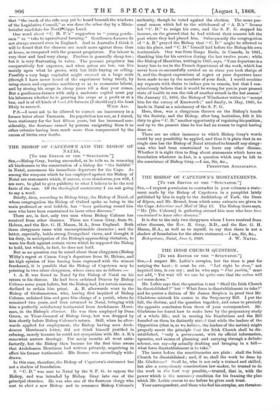THE BISHOP OF CAPETOWN AND THE BISHOP OF NATAL.
[To THE EDITOR OF THE " SPECTATOR."] SIR,—Bishop Gray, having succeeded, as he tells us, in removing all hindrances to the consecration of a bishop for "the faithful" in Natal, announces his immediate departure for the Cape. As among the weapons which he has employed against the Bishop of Natal are statements which, if untrue, seem slanderous, you will, I am sure, be glad to give publicity to what I believe to be the real facts of the case. Of the theological controversy I am not going to say a word.
Briefly, then, according to Bishop Gray, the Bishop of Natal, of whose congregation the Bishop of Oxford spoke as being in the main professed or real infidels, has "been gathering round him men who have been constrained to leave other dioceses."
There are, in fact, only two men whom Bishop Colenso has received from other dioceses. These are Canon Gray, from St. Helena, and the Rev. G. H. Mason, M.A., from England. Both these clergymen came with unexceptionable character ; and the latter, especially, holds strong Evangelical views, and thought it -his duty, in anticipation of the Bishop's approaching visitation, to warn his flock against certain views which he supposed the Bishop to hold, but which, in fact, he does not hold.
But as no question can be raised about these clergymen (Bishop Wilby's regret at Canon Gray's departure from St. Helena, and his high opinion of him having been expressed with the utmost frankness), it is possible that the Bishop of Capetown may be pointing to two other clergymen, whose cases are as follows :—
1. A. B. was found in Natal by the Bishop of Natal on his return to his diocese. He had been ordained Deacon by Bishop Colenso some years before, but the Bishop bad, for certain reasons, declined to ordain him priest. A. B. afterwards went to the Bishop of Grahainstown, who, having first inquired of Bishop Colenso, ordained him and gave him charge of a parish, where he remained two years, and then returned to Natal, bringing with him a perfectly satisfactory testimonial from Archdeacon Merri- man, in the Bishop's absence. He was then employed by Dean Green, as Vicar-General of Bishop Gray, but was dropped by him shortly before Bishop Coleuso's return. Still, when he after- wards applied for employment, the Bishop having seen Arch- deacon Merriman's letter, did not think himself justified in refusing, merely because he could not sympathize with Mr. A. B.'s somewhat narrow theology. For many months all went satis- factorily, but the Bishop then became for the first time aware that Archdeacon Merriman had written privately, negativing in effect his former testimonial. His licence was accordingly with- drawn.
In this case, therefore, the Bishop of Capetown's statement has not a shadow of foundation.
2. "C. D." was sent to Natal by the S. P. G. to oppose the Bishop, and was intruded by Bishop Gray into one of the principal churches. He was also one of the fourteen clergy who met to elect a new Bishop and to renounce Bishop Colenso's authority, though he voted against the election. The same per- sonal reason which led to the withdrawal of "A. B.'s " licence led "C. D." to resign his cure, and the S. P. G. stopped his income, on the ground that he had without their consent left the post where they had placed him. Subsequently the congregation of "A. B." prayed the Bishop that "C. D." might be allowed to take his place, and "C. D." himself laid before the Bishop his own testimonials. One was from Gaspe Basin, in Canada, in 1861, thanking him for his services during the last twelve years ; while the Bishop of Mauritius, writing in 1865, says, "Your departure is a heavy loss to me in the French department of the work, which has never been so successfully carried on as since you took charge of it, and the deepest expressions of regret at your departure have been made to me by the members of your flock. I would combine my requests with theirs to induce you to remain, but that I con- scientiously believe that it would be wrong for you in your present state of health to run the risk of another attack in the hot season." On January 17, 1866, the Bishop of Winchester writes to "accept him for the curacy of Einsworth ;" and finally, in May, 1866, he lands in Natal as a missionary of the S. P. G.
Here, then, was a clergyman thrown on the Bishop's hands by the Society, and the Bishop, after long hesitation, felt it his duty to give" C. D." another opportunity of regaining his position, and up to the present time he has had no reason to regret having done so.
There are no other instances to which Bishop Gray's words could by any possibility be applied, and thus it is plain that in no single case has the Bishop of Natal attached to himself any clergy- man who had been constrained to leave any other diocese. Whether it is right thus to fling about statements which have no foundation whatever in fact, is a question which may be left to the conscience of Bishop Gray.—I am, Sir, &c.,
PRESBYTER ANGLICANUS.






























 Previous page
Previous page